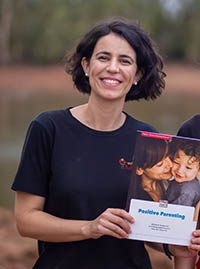 Georgie Woods is an occupational therapist at Outback Futures, a not-for-profit that provides allied and mental health services, including parenting support, to remote bush communities.
Georgie Woods is an occupational therapist at Outback Futures, a not-for-profit that provides allied and mental health services, including parenting support, to remote bush communities.
Based primarily in Queensland, the organisation extends its services to rural regions, including McKinlay, Cloncurry, Longreach, Winton, Barcaldine, Dysart, Blackall, and Tambo. Outback Futures works with communities by recognising their current strengths and assisting them in preparing for the future while celebrating what makes these communities unique.
According to Georgie, this is achieved by employing a distinctive "work in, work out" model.
“This involves visiting bush communities about four times a year to deliver services on the ground, followed by ongoing support via telehealth services from our Brisbane office,” she said.
“By combining these approaches, Outback Futures can build deep connections with individual communities, understanding their unique challenges. It also allows us to provide tailored services, including occupational therapy, speech pathology, counselling, psychology, and general whole of community well-being initiatives.”
A key aspect of their approach is focusing on the whole family unit through programs like Triple P.
“We offer Triple P workshops, individual and group sessions, and community-level programs, adapting to the specific needs of each community,” Georgie said.
“The Triple P parenting approach promotes child development and behaviour change, and allows me to connect with my bush families and community groups.”
Georgie’s connection to Triple P began as a student at the University of Queensland, where the program was first developed. Her colleagues at Outback Futures, who had attended various Triple P training sessions, also shared their experiences and the program’s effectiveness in practical, real-world settings.
This positive feedback and Triple P’s well-researched and evidence-based focus motivated Georgie to pursue training in 2023.
“Participating in the online training was a great experience for me,” she said.
“Our facilitator fostered a strong connection among the trainees, scattered across Brisbane, Queensland, and interstate locations.
“This camaraderie and a shared interest in Triple P made the virtual training feel incredibly engaging and connected.
“The training offered a perfect blend of information gathering and sharing, allowing me to enhance my service delivery as an occupational therapist. Additionally, it provided a safe space to learn about how other services are implementing Triple P strategies.”
Georgie said she gained practical insights into how Triple P could be applied.
“For instance, by accessing printed Triple P resources such as handbooks and worksheets, I could distribute them to local groups, like kindergartens in Cloncurry. This helped raise awareness of Triple P and also facilitated better connections with outback communities, where access to services is often more challenging than in metropolitan areas.
“Being in an outback setting requires assessing the community's needs on the ground, and Triple P’s support for both individual family units and larger communities is so valuable. It’s also wonderful that families can access Triple P online as well.”
Georgie recommends that other organisations partner with Triple P for free Queensland Government-funded training.
“The program’s variety of training and programs make it an excellent resource for organisations that support families and communities.
“I'd encourage people to connect and learn about all Triple P has to offer.”




